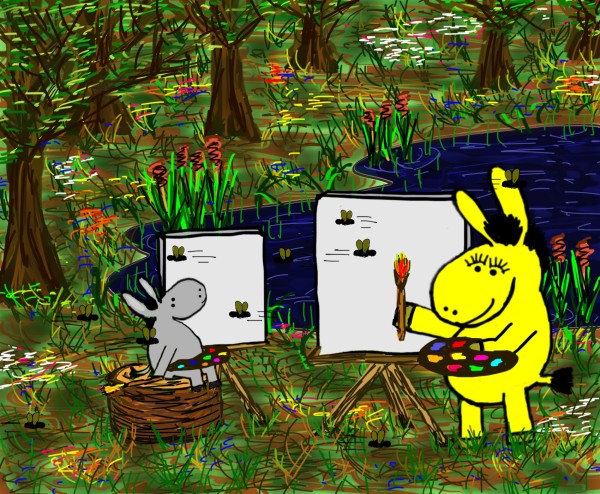
Abstract paintings generally emphasize rhythm, shape and color.
Excellent! said Bonny.
Do you ever get the feeling, said Blurtso, you’re being constantly manipulated? By the advertisers? said Harlan. Yes, said Blurtso, by the newspapers, and billboards, and radio, and television, and Internet, and loudspeakers at ball games. And signs, said Harlan, painted on city buses? Yes, said Blurtso, everywhere I turn someone is telling me what to want and what to think. And people are inviting the advertisers, said Harlan, to live in their pocket. In their pocket? said Blurtso. Yes, said Harlan, the iPhone6 will be available soon.
The city before the city
was the earth
before hands held it.
The dark soil breathed
and the grasses sang,
until they were strangled
with slow cement.
To construct their shelters
the people went to the hills
where they razed
the orchestra of the trees,
stripping their strings,
so the limbless trunks
could be stacked and sold,
and only silence remained
where the music had been.
Not satisfied with a single roof,
they hired bandits
to return with their blades
seeking the slow heart
of the sequoia.
The lawyers at their windows,
unable to see through the smog,
signed the death warrants
of the hills,
while the rest
sat stupidly in their homes,
watching the walls grow,
until there was no door
for day to enter,
no crack for the wind,
and the dim light remaining
was tinted and conditioned.
When their prisons were complete,
they thrust their hands
beneath the soil
and melted its singing metal
into the graceless lines
of their automobiles.
In the sudden haste
they went from house to house,
smelling of synthetics,
stepping out only long enough
to curse the wind’s breath
disheveling their hair.
They put wheels on their homes
and carried them
groaning up the canyon.
They spread like smoke
through the trees,
splashing the branches
with obscene shapes and sounds.
They stayed until dust rose
where there had been blossoms,
and engines roared
where there had been birds,
and the waters choked
on their sudden blackness.
They left their broken trail
of plastics and noise
until even the wind could not wash
their echo from the trees.
Oh Lizzy, if not for you
the seasons would surely die!
Your sweet hooves
stepped from the foam
like polished shells
washed upon the shore.
You laughed
with the curl of the waves,
and your slow breath copied
its repeated rhythm and sway.
Your prints swirled in the tide,
and the jealous sea reached
to pull you back,
but its frothy fingers
touched only your heels,
then stretched and expired,
sinking in the sand.
Your hooves continued
over the hills and valleys,
moving in perfect balance
when the earth narrowed to a log
fallen across the stream.
They continued past the remains
of the beaver’s winter work,
along the unscarred path,
to the deer’s scented trail
that led secretly back
to the bank of the singing brook.
It was there your eyes learned
their color from the branches,
and stole the silver light
of the stone’s push upon the stream.
It was there your soul learned
the circling chase of the birds,
and your hair stole its aroma
from the cool in the shadows.
It was there your heart learned
the wisdom of the water.
When the wind
whispered your name
you followed it to the top of
a red-rock mountain.
It pressed its kiss against you,
sweeping the length of your snout,
and caressing with delicate patience
the curve and lilt of your ears.
There,
braced against the wind,
the extending light caught
and filled your form
with its rising breath of fire.
What did I see
when I first stepped up
to Paris from the metro at Montmartre?
What moved
in the light among the shadows
in the columns of Saint Peter’s?
What whispered
in the light of Interlaken
when crossing the Brienzersee?
Why so many miles?
Why the discomfort
and tedious lines that thinned
until I was alone
on a rock shattering the Mediterranean?
Why so many conductors
recording the course of my name?
Why so much motion
when my hooves were content to remain slippered
and cuddled on the couch?
A donkey crossed a dirt road
behind a church in Segovia.
His hooves and snout
were the color of the land.
He was laden with stones,
and was completely content.
In Paris the sun
woke a jenny asleep
beneath a bridge on the Seine.
She was happy.
She had no place to go.
She stopped to ask questions
no one has time to ask.
She took me to see her friends
gathered on the bank,
and we laughed
and lamented the sadness of change.
From the gypsies in Venice
I expected to hear the same,
but they didn’t want to talk.
They offered to read my future,
and I offered to read theirs.
I wanted to see
how they all fit inside me.
I wanted to see
what my hooves had created
with different hopes and dreams.
I walked and I walked and I walked,
and did what the natives did.
I wonder what I have learned?
Was the answer spelled
in a pattern of bubbles
splashed on a sidewalk in Rome?
Was it whispered
in the song
of a fountain in Seville?
At times a voice will call.
It is an image or an echo
rising from a night in Namur,
lingering on a street in Siena,
or whistling in the wind at Cérbère.
And though I go home now,
a part of me still waits
at an interminable light in Madrid,
or continues in the rain,
stepping through the past
on the stones of Mycenae.